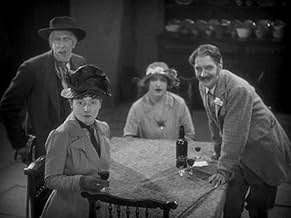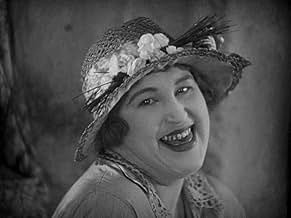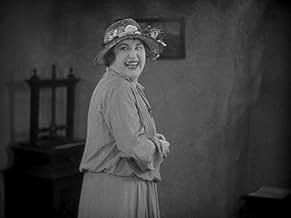IMDb रेटिंग
5.8/10
3.3 हज़ार
आपकी रेटिंग
अपनी भाषा में प्लॉट जोड़ेंAfter his daughter weds, a middle-aged widower with a profitable farm decides to remarry, but he has problems choosing a suitable mate.After his daughter weds, a middle-aged widower with a profitable farm decides to remarry, but he has problems choosing a suitable mate.After his daughter weds, a middle-aged widower with a profitable farm decides to remarry, but he has problems choosing a suitable mate.
Lillian Hall-Davis
- Araminta Dench - Sweetland's Housekeeper
- (as Lilian Hall-Davis)
Diana Napier
- Sibley Sweetland
- (as Mollie Ellis)
Harry Terry
- Guest at Wedding Breakfast
- (बिना क्रेडिट के)
- …
फ़ीचर्ड समीक्षाएं
The first half is rather slow, but keep going - it's definitely worth it. The humour in Hitchcock's films is generally based around great character actors (e.g. Jessie Royce Landis in To Catch a Thief and North by NorthWest), and here not one of the actors disappoints. Lillian Hall Davis has a better part in the Ring (also 1928 - Gordon Harker is again very amusing in it too), but is lovely in this film. Sound would have added nothing. My 8-year old daughter was apprehensive about watching a silent film, but once things started to get going in the second half, was hooked.
Hitchcock referred to it in later years as one of his "photographed plays", but the action occurs in several locations, so is nowhere near as constrained as many of his films (plays or not). In fact, even though the location shots are few and far between, they really give this film a non-studio feel.
All of Hitchcock's films are notable for their visual storytelling (look at the initial scene-setting in Rear Window that speaks volumes without a single word being uttered), and it is interesting to see the origins of this, and the great influence of German Expressionism.
Hitchcock referred to it in later years as one of his "photographed plays", but the action occurs in several locations, so is nowhere near as constrained as many of his films (plays or not). In fact, even though the location shots are few and far between, they really give this film a non-studio feel.
All of Hitchcock's films are notable for their visual storytelling (look at the initial scene-setting in Rear Window that speaks volumes without a single word being uttered), and it is interesting to see the origins of this, and the great influence of German Expressionism.
"The Farmer's Wife" is a charming rustic, semi-romantic comedy from the silent picture era. Without seeing the credits, you might never guess that it was made by the "Master of Suspense", Alfred Hitchcock - but if you know who the director was, it is easy to see the masterful touches Hitchcock was known for.
The story is a simple one. Farmer Sweetland (Jameson Thomas) has lost his beloved wife some time ago, and comes to decide that he should marry again. He methodically evaluates, and plans to propose to, all of the eligible women he can think of. But all the while he overlooks the best, and obvious (to the audience) choice: his devoted housekeeper Araminta (Lillian Hall-Davis, who is charming in the role). "Minta" is far wiser, sweeter, and prettier than the other candidates, and she also cares for Sweetland in a way they never will. The plot, therefore, revolves around whether he will figure this out before he gets stuck with an unsuitable mate instead.
Hitchcock applies the creativity and attention to detail that he would later use in his great suspense films, and makes out of a simple plot a movie that is very funny, and also at times quite touching. A great deal of the characters' feelings and thoughts are communicated without dialogue cards, through masterful silent camera work. The most powerful recurring image is a pair of chairs near the fireplace, where Farmer Sweetland had obviously spent many happy hours with his dear departed first wife. Early in the film, as he hosts a wedding dinner for his daughter, he begins to look longingly at the chairs, and we know what he is thinking even before the dialogue cards tell us. As the film proceeds, we occasionally come back to the fireplace, and eventually "Minta" begins to sit with him by the fireplace, sympathizing and helping with his disappointed matrimonial projects. The suggestion is obvious to everyone but Sweetland.
In the lead role, Thomas responds to Hitchcock's direction, sometimes making his character appear somewhat ridiculous in his miscalculated plans, and at other times evoking our complete sympathy and pity for his loneliness. The rest of the cast works very well too, especially Gordon Harker, whose expert comic timing plays wonderfully in the role of Farmer Sweetland's handyman.
There is one long, hilarious comic sequence, at a house party hosted by one of Sweetland's prospective mates, and you have to watch it two or three times to catch all of the detail Hitchcock packed into the sequence. The rest of the movie is filled with lighter comic touches, and concentrates on giving us a surprisingly tender look at the characters' lives.
Hitchcock fans should take delight in seeing how the master used his talents in such a different genre, and any fan of romantic comedies who is willing to try a silent film should also enjoy "The Farmer's Wife".
The story is a simple one. Farmer Sweetland (Jameson Thomas) has lost his beloved wife some time ago, and comes to decide that he should marry again. He methodically evaluates, and plans to propose to, all of the eligible women he can think of. But all the while he overlooks the best, and obvious (to the audience) choice: his devoted housekeeper Araminta (Lillian Hall-Davis, who is charming in the role). "Minta" is far wiser, sweeter, and prettier than the other candidates, and she also cares for Sweetland in a way they never will. The plot, therefore, revolves around whether he will figure this out before he gets stuck with an unsuitable mate instead.
Hitchcock applies the creativity and attention to detail that he would later use in his great suspense films, and makes out of a simple plot a movie that is very funny, and also at times quite touching. A great deal of the characters' feelings and thoughts are communicated without dialogue cards, through masterful silent camera work. The most powerful recurring image is a pair of chairs near the fireplace, where Farmer Sweetland had obviously spent many happy hours with his dear departed first wife. Early in the film, as he hosts a wedding dinner for his daughter, he begins to look longingly at the chairs, and we know what he is thinking even before the dialogue cards tell us. As the film proceeds, we occasionally come back to the fireplace, and eventually "Minta" begins to sit with him by the fireplace, sympathizing and helping with his disappointed matrimonial projects. The suggestion is obvious to everyone but Sweetland.
In the lead role, Thomas responds to Hitchcock's direction, sometimes making his character appear somewhat ridiculous in his miscalculated plans, and at other times evoking our complete sympathy and pity for his loneliness. The rest of the cast works very well too, especially Gordon Harker, whose expert comic timing plays wonderfully in the role of Farmer Sweetland's handyman.
There is one long, hilarious comic sequence, at a house party hosted by one of Sweetland's prospective mates, and you have to watch it two or three times to catch all of the detail Hitchcock packed into the sequence. The rest of the movie is filled with lighter comic touches, and concentrates on giving us a surprisingly tender look at the characters' lives.
Hitchcock fans should take delight in seeing how the master used his talents in such a different genre, and any fan of romantic comedies who is willing to try a silent film should also enjoy "The Farmer's Wife".
I have both versions, long and short, of "The Farmer's Wife", and they are identical except for the speed at which they were recorded onto tape/DVD. I strongly recommend against the 129-minute version, as it is slower than real-life speed and drags the humor from the film. The shorter version is much funnier and more like Hitchcock, whose films weren't known for their dragginess.
Jameson Thomas, who plays Samuel Sweetland, was at the time of filming a huge star in England. In 1930 he and his wife left England for Hollywood, where he played a few leads in "B" pictures and then settled into a continuous second lead/character groove. He's the doctor at the end of "The Invisible Man" who tells Henry Travers of Claude Rains' demise: "I'm afraid the end will be rather terrible." He also played Mr. Semple, the twitchy false heir, in "Mr. Deeds Goes to Town."
Jameson Thomas, who plays Samuel Sweetland, was at the time of filming a huge star in England. In 1930 he and his wife left England for Hollywood, where he played a few leads in "B" pictures and then settled into a continuous second lead/character groove. He's the doctor at the end of "The Invisible Man" who tells Henry Travers of Claude Rains' demise: "I'm afraid the end will be rather terrible." He also played Mr. Semple, the twitchy false heir, in "Mr. Deeds Goes to Town."
Slight but enjoyable early Alfred Hitchcock movie about a widower (Jameson Thomas) who sets out to find a new wife with help from his loyal housekeeper (Lillian Hall-Davis). It's a charming and touching story. Not quite what you would expect from the eventual Master of Suspense. It's a good-looking film, as well. Thomas and Davis are both likable. Gordon Harker is fun as the farmer's handyman, Churdles Ash. Love that name. It's nothing to get worked up over but a pleasant enough film that's worth a look to more than just Hitchcock completists.
I saw this years ago, enjoyed but forgot about it. On retrospect it seems a very long drawn out 96 minute comedy film with a flimsy plot, even so I wonder what a 129 minute version would be like.
Jameson Thomas plays thicko widower farmer who can't see beyond the end of his nose when it comes to looking to honour a woman by marrying him. It's obvious from the first reel what the story will be and the eventual conclusion, but for all that it's still well worth watching. Some of the outdoor shots are delightful, portraying the English countryside impressionistically, the indoor usually portray people in the throes of pigging themselves within slapstick routines. The farmers' handyman Gordon Harker was even stranger than his master, with make up absolutely caked on his face for some reason.
Altogether, a nice little film, totally inconsequential but with some nice touches from Hitch and fluid camera movements, all helping maintain interest.
Jameson Thomas plays thicko widower farmer who can't see beyond the end of his nose when it comes to looking to honour a woman by marrying him. It's obvious from the first reel what the story will be and the eventual conclusion, but for all that it's still well worth watching. Some of the outdoor shots are delightful, portraying the English countryside impressionistically, the indoor usually portray people in the throes of pigging themselves within slapstick routines. The farmers' handyman Gordon Harker was even stranger than his master, with make up absolutely caked on his face for some reason.
Altogether, a nice little film, totally inconsequential but with some nice touches from Hitch and fluid camera movements, all helping maintain interest.
क्या आपको पता है
- ट्रिवियाUnlike most of his later films, this film does not have a cameo by Sir Alfred Hitchcock.
- गूफ़After Louisa rejects Farmer Sweetland, his horse changes position it between shots as he mounts it.
- भाव
Farmer Sweetland: ...I am a man that a little child can lead but a regiment of soldiers couldn't drive.
- कनेक्शनFeatured in The Skin Game (1931)
टॉप पसंद
रेटिंग देने के लिए साइन-इन करें और वैयक्तिकृत सुझावों के लिए वॉचलिस्ट करें
विवरण
- रिलीज़ की तारीख़
- कंट्री ऑफ़ ओरिजिन
- भाषा
- इस रूप में भी जाना जाता है
- La esposa del granjero
- फ़िल्माने की जगहें
- वेल्स, यूनाइटेड किंगडम(Exterior)
- उत्पादन कंपनी
- IMDbPro पर और कंपनी क्रेडिट देखें
बॉक्स ऑफ़िस
- दुनिया भर में सकल
- $152
- चलने की अवधि
- 1 घं 40 मि(100 min)
- रंग
- ध्वनि मिश्रण
- पक्ष अनुपात
- 1.33 : 1
इस पेज में योगदान दें
किसी बदलाव का सुझाव दें या अनुपलब्ध कॉन्टेंट जोड़ें































